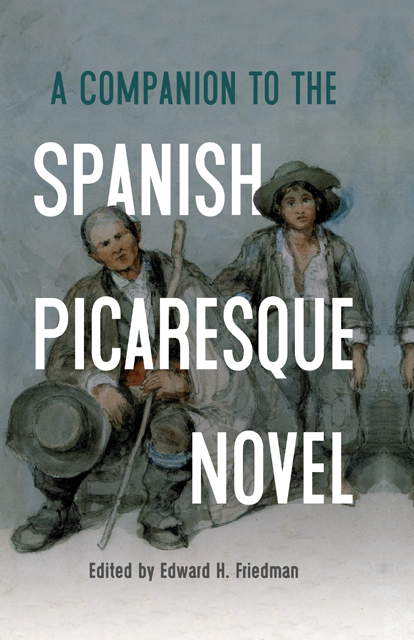Book contents
- Frontmatter
- Contents
- List of Illustrations
- List of Contributors
- Foreword
- 1 The Picaresque as a Genre
- 2 On the Picaresque and Its Origins
- 3 Francisco Delicado, La lozana andaluza
- 4 Lazarillo de Tormes
- 5 Mateo Alemán, Guzmán de Alfarache
- 6 Francisco de Quevedo, La vida del Buscón
- 7 La pícara Justina
- 8 Alonso Jerónimo de Salas Barbadillo, La hija de Celestina
- 9 Miguel de Cervantes and the Picaresque
- 10 Vicente Espinel, Marcos de Obregón
- 11 Carlos García, La desordenada codicia de los bienes agenos
- 12 Estebanillo González
- 13 Critical Approaches to the Picaresque
- 14 The Picaresque in Spanish America
- 15 Continuations: France and England
- 16 The Continuity of the Picaresque: Spain
- Bibliography
- Index
- Tamesis • Companions
10 - Vicente Espinel, Marcos de Obregón
Published online by Cambridge University Press: 11 January 2023
- Frontmatter
- Contents
- List of Illustrations
- List of Contributors
- Foreword
- 1 The Picaresque as a Genre
- 2 On the Picaresque and Its Origins
- 3 Francisco Delicado, La lozana andaluza
- 4 Lazarillo de Tormes
- 5 Mateo Alemán, Guzmán de Alfarache
- 6 Francisco de Quevedo, La vida del Buscón
- 7 La pícara Justina
- 8 Alonso Jerónimo de Salas Barbadillo, La hija de Celestina
- 9 Miguel de Cervantes and the Picaresque
- 10 Vicente Espinel, Marcos de Obregón
- 11 Carlos García, La desordenada codicia de los bienes agenos
- 12 Estebanillo González
- 13 Critical Approaches to the Picaresque
- 14 The Picaresque in Spanish America
- 15 Continuations: France and England
- 16 The Continuity of the Picaresque: Spain
- Bibliography
- Index
- Tamesis • Companions
Summary
Published in 1618, Vicente Espinel’s Marcos de Obregon is a text that has lived on the unstable fringe of the picaresque for much of its history. Scholars have dedicated considerable scholarly energy to defining and justifying its positionality rather than considering how it exists within a discursive tradition that transcends closed definitions of genre. Much of this debate has centered on exploring the relationship between Vicente Espinel (1550–1624) and his literary simulacrum, Marcos de Obregon, culminating in George Haley’s 1959 monograph Vicente Espinel and Marcos de Obregon: A Life and Its Literary Representation. While perhaps rewarding for critics who have sought to deconstruct the text into its autobiographical and fictional elements, this debate does a disservice to the textuality of the text and ignores Roland Barthes’s (in)famous observation that the author is dead. And so, the critical preoccupation with Vicente Espinel and his mediated autobiography has, to some degree, both informed and limited one’s ability to read the text as a cultural artifact that clearly dialogues with earlier picaresque texts. As Barthes wrote some years later: “The birth of the reader must be at the cost of the death of the author” (Roland Barthes, Image-Music-Text 148).
Barthes’s statement is particularly important to the picaresque, a literary discourse that formally acknowledges the role and presence of the reader by including interlocutors such as “vuestra merced” (your mercy) in Lazarillo de Tormes (Lazarillo de Tormes, ed. Francisco Rico [1992], 9) or directly addressing itself to us, like the “curioso lector” (careful reader) in Guzman de Alfarache (Mateo Aleman, Guzman de Alfarache, ed. Jose Maria Mico [1987], I, 125). Helen Reed dedicated a well-conceived monograph entitled The Reader in the Picaresque Novel (1984) to this topic. In that context, we must understand picaresque discourse not simply as one monolithic construct in which a lower-class uneducated protagonist shares a first-person narrative of suffering that serves to critique life in early modern Spain. Marcos, as we will see, challenges and tests the limits of this literary archetype. Like so many other picaros, Marcos engages in the “autobiographical act” as a “practice of self-invention” that reveals the “fictive nature of selfhood” (Paul John Eakin, Fictions in Autobiography 182).
- Type
- Chapter
- Information
- A Companion to the Spanish Picaresque Novel , pp. 117 - 126Publisher: Boydell & BrewerPrint publication year: 2022



